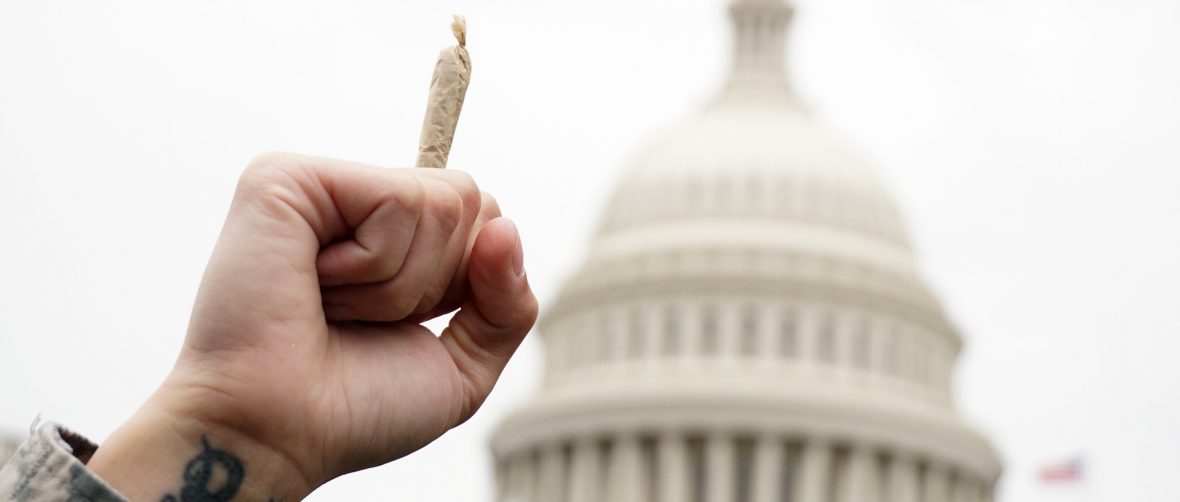Even before it began, 2019 has been hailed as the year of marijuana, with good reason: the number of Americans who support legalization has reached record highs, and an increasing number of Democratic presidential candidates are advocating for drug reform and an end to our draconian, racist drug laws.
On Thursday morning, Reps. Tulsi Gabbard (D-HI) and Don Young (R-AK) introduced what they called a “landmark” piece of legislation, the Ending Federal Marijuana Prohibition Act of 2019, which is “the only bipartisan piece of legislation that would allow states to make independent choices about their marijuana programs,” according to Young.
In a press conference, Gabbard, who has also announced her candidacy for the 2020 presidential election, said the bill would remove marijuana from the federal Controlled Substances list, thereby allowing states to set up their own laws regulating the substance.
“We’ve seen now for generations how our archaic marijuana policies based on outdated myths and misplaced stigma have been used to wage a failed war on drugs,” Gabbard said. “We’ve seen the impact on families torn apart, communities left fractured, and the over-criminalization and mass incarceration that has become the norm, making an impact on the people in our communities as well as the taxpayer dollars being spent on this broken criminal justice system.”
In his statement, Young focused on the fact that federal drug laws penalize those who own and operate legal marijuana businesses, who are generally barred from opening bank accounts or receiving loans. “As businessmen, the biggest challenge they have is not being able to bank,” he said. “This bill takes care of it.” He also emphasized that the bill would allow individual states to “make the decisions [regarding marijuana industry regulation] for the people.”
“This bill is long overdue. This is a bill that solves a problem,” he said. “Get the government out of it.”
The two also introduced a second bill, the Marijuana Data Collection Act, a report on the impact of state legalization policies on the economy and public health. “This bill will allow us the opportunity to make sure we are governed by the truth and facts and not misinformation and lies,” Gabbard said.
Currently, 10 states and the District of Columbia have legalized marijuana for recreational use, while more than 30 states have made marijuana legal for medical use. Nonetheless, hundreds of thousands of people are arrested for marijuana possession every year, with nearly 659,700 arrests in 2017 alone.
Gabbard pointed out that current drug laws disproportionately affect low-income people and people of color, who are three times more likely to be arrested for marijuana possession despite similar use rates in the black and white communities, according to data from the Southern Poverty Law Center. In her own state of Hawaii, Gabbard said, draconian federal marijuana laws had “created such a strain on our prison system” that thousands of inmates prosecuted under possession laws were forced to be shipped out to prisons on the mainland.
“The bottom line is, our policies need to make sense for our people and our country,” she said. “They should not cost our economy and society and criminal justice system billions every year. We must end the federal prohibition on marijuana now.”
To bolster her point, Harry Kelso, a Virginia resident who was sentenced to 10 years in prison in 2008 under the state’s mandatory minimum sentencing laws, shared his experience with the criminal justice system during the press conference. “Ten years of my life was taken,” Kelso said. “Ten years from my family, 10 years of being a productive citizen of society, 10 years of holidays. Kelso referred to draconian drug laws as “cruel and unusual punishment” for non-violent offenders.
“Something has got to change,” he said.
This isn’t the first major cannabis bill to be introduced this year. In February, Senator Ron Wyden (D-OR) introduced S. 420, an extensive bill aimed to tax and regulate marijuana like alcohol. A companion bill was introduced in the House by Oregon Democrat Rep. Earl Blumenauer,

